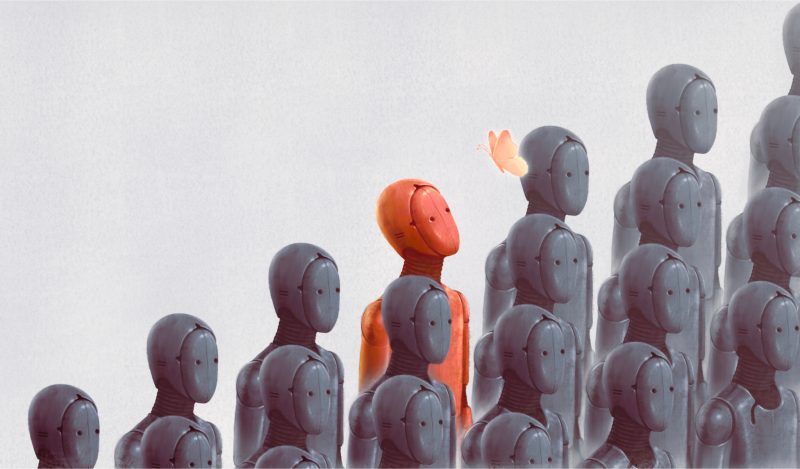One of the earliest memes to surface during the pandemic was “muh freedumb.” The words became code for a stock character—a tattooed man wearing camo gear and a baseball cap, spewing viral particles while yelling about his rights. A selfish idiot.
The memes kept coming: “Warning, cliff ahead: keep driving, freedom fighter.” “Personal freedom is the preoccupation of adult children.” And most recently: “Freedom is a two-way street—unless you’re blocking it with your truck.”
It’s astonishing, when you stop and think about it: freedom, for centuries an aspiration of democratic societies, has devolved to a laughingstock. It’s one of Covid-19’s most unfortunate victims.
In fact, the world’s tilt away from freedom began long before Covid. According to data from an organization called Freedom House, 2005 was the last year that saw a net increase in global democracy. Every year after that, more countries lost ground than gained it. The year 2020 had the worst track record by far, with 73 countries losing democracy points and only 28 raising their score. The Freedom of the World 2021 report called out the pandemic policies as a key contributor to the drop: “As Covid-19 spread during the year, governments across the democratic spectrum repeatedly resorted to excessive surveillance, discriminatory restrictions on freedoms like movement and assembly, and arbitrary or violent enforcement of such restrictions by police and nonstate actors.”
Most people didn’t mind: if anything, they welcomed the clamp-down. Perhaps the previous 15 years of democratic erosion had prepared them for this. Or maybe they believed that freedom had no place during a crisis of Covid’s magnitude.
Freedom in a pandemic
People have argued that “nobody has the freedom to infect others.” While reasonable at first blush, this statement doesn’t stand up to scrutiny. For one thing, no sane person seeks the “freedom to infect” any more than a vehicle driver seeks the freedom to slam into pedestrians. It’s a disingenuous allegation that warps a simple desire for personal agency into a malevolent impulse. Second, people have always infected each other. They’ve passed along colds, flus and other bugs, creating long ribbons of transmission that occasionally caused someone to die. Before Covid, we ascribed this to the victim’s frailty. We grieved the loss, but didn’t go hunting for a “killer” to blame. It’s only since Covid that viral transmission has mutated into a crime.
People have also said that “with freedom comes responsibility.” Sure, that’s fair. But even responsibility has limits. Society cannot function if each individual bears the full weight of other people’s health. Aaron Schorr, a Yale University student who had to take immune-suppressing medication in the summer of 2021, understood this when he wrote, in a January 2022 issue of Yale News: “I didn’t expect the government to structure its entire response around my personal well-being. Feeling unsafe? By all means take extra precautions, but 4,664 undergraduates should not be forced to adhere to the same standard.”
If we insist on curtailing basic freedoms until the world is scrubbed of all risk, we will curtail them forever. As we step into the endemic phase of Covid, we need to unpack the idea of “acceptable risk” in exchange for more liberty. “The long-standing tension between individual liberty and the collective good is complicated,” Dahlia Lithwick wrote in a May 2020 article in Slate. “The balance often tilts, trade-offs are made, federal and state governments shift clumsily along together, and the balance tilts again.”
UNESCO’s 2005 Universal Declaration of Bioethics and Human Rights leans even further toward the individual. Article 3 of the Declaration makes this plain: “The interests and welfare of the individual should have priority over the sole interest of science or society.” The statement seems so removed from our post-pandemic reality that it may as well have dropped from another planet. Nonetheless it expresses an enduring truth: that a bricks-and-mortar individual takes precedence over an abstract collective. Does this mean we don’t take care of our neighbours? Of course not: it simply means that individual rights shouldn’t disappear under a vague, amorphous “common good” that nobody can agree on.
An uneasy coexistence
As noted by Lithwick, individual liberty and public safety coexist in a tense pas-de-deux, continually stepping on each other’s toes. The freedom to have sex with lots of people raises the risk of sexually transmitted diseases. The freedom to travel alone raises the risk of getting mugged. The freedom to drink and use drugs raises the risk of addiction and other health problems.
Large cosmopolitan centres such as New York or London attract people from around the world because of their strong freedom culture. People living in such places are free to choose the careers, clothes, and companions they want. In return, they take on a higher risk of being stalked, fired from their job, or dumped by their partner.
The opposite obtains in cultures like the Amish, who use a set of rules called Ordnung as a basis for daily living. The Ordnung forbids lawsuits, divorces, and running for office. It restricts the choice of clothing and even the style of buggy to ride in. There’s not much freedom to be had in a culture that doesn’t allow you to hop on a plane or learn a musical instrument. On the plus side, a lifetime of manual labor and fresh air leaves the Amish healthier in later life, with a lower incidence of cancer, cardiovascular disease, and diabetes. Gun violence is rare—a baked-in feature of a society that prohibits bearing arms against others.
Most of us in mainstream Western society have grown up with large doses of freedom. We understand the trade-off—more freedom, more risk—but wouldn’t have it any other way. Then along comes the pandemic, and public sentiment does an about-face. Safety becomes the all-consuming preoccupation and freedom gets branded as right-wing stupidity. Freedom to take a walk on the beach? Stop killing the vulnerable! Freedom to earn a living? The economy will recover! “Your right to get your hair streaked doesn’t trump my grandfather’s right to life,” shout the Twitterati, turning freedom into a caricature.
One of the most deplorable casualties of Covid culture has been freedom of expression, a core principle in the UN’s Universal Declaration of Human Rights. Experts speaking publicly about the harms of lockdown have faced systematic ostracism from mainstream media, especially left-wing news outlets. Here’s Oxford University epidemiologist Sunetra Gupta, writing in the UK’s Daily Mail in October 2020: “I do have deeply held political ideals—ones that I would describe as inherently left-wing. I would not, it is fair to say, normally align myself with the Daily Mail.” But she had no choice: left-wing media wouldn’t give a lockdown critic the time of day.
Restoring the shine
Freedom desperately needs a comeback from its present incarnation as an indulgent frill. We need to peel off the clownish garments that have draped the word during the pandemic: the silly memes, the hillbilly overtones, the mantle of egoism. Placing a high value on freedom doesn’t mean you don’t care about people, any more than a passion for mountains signals indifference to the sea.
Freedom matters—even in a pandemic. Without freedom, elderly people may spend their remaining time on earth isolated from their loved ones, and we know that social isolation kills. Without freedom, people may lose not only their livelihoods but the momentum and opportunity to build careers as flight attendants, orchestra musicians, chefs, or scientists working on viruses. Without freedom, children may lose important and irretrievable experiences and milestones. Without freedom, life becomes a shadow of itself.
Surrender of personal freedom carries the plot of many a dystopian novel. The Handmaid’s Tale, 1984, Fahrenheit 451, The Giver—what these novels have in common are societies marked by inflexible rules, with extreme punishment for challenging the regime set up by the elite. Safe, lifeless societies. Prisons without bars.
In these novels, the loss of freedom goes unchallenged until an individual or group recognizes a different way to live and inspires others to rise up against the overlords. The rules and roles crumble, leaving the protagonists free to choose their own destinies.
During this pandemic and the next one, we should be allowed to discuss—in good faith and without censure—how to protect both lives and the freedom to live them.
Join the conversation:

Published under a Creative Commons Attribution 4.0 International License
For reprints, please set the canonical link back to the original Brownstone Institute Article and Author.









